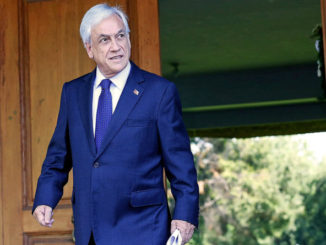
SANTIAGO – Starting April 16, Haitians seeking to get into Chile will now need to request a visa from the Chilean consulate in Port-au-Prince, the South American country’s government has announced.
President Sebastian Piñera Monday announced a bill to regulate migratory flows, through the application of visas, saying “We want these people to enter Chile in accordance with our laws, integrate into our society, be a contribution to our country and realize their dreams of a better life […]”.
Among the measures proposed in the decree, Piñera decided to require for Haitians a simple tourist consular visa, with the right to enter and stay in Chile for a maximum period of 30 days. Holders of this visa will not be able to work or earn money in Chile.

Haitians, who already have a family member in Chile having a regular immigration status, will be able to access the 12-month family reunification visa. This visa must be requested from the Consulate of Chile in Haiti and will be subject to a maximum annual quota.
Other new measures accompany the decision of the Chilean Government among others: the entry ban for persons with criminal records, the creation of a national migration service, mandatory application outside Chile for a temporary residence visa that will not be interchangeable with a tourist visa and a simplified eviction mechanism for offenders.
All these measures will come into effect, according to the Chilean press, as of April 23, 2018.
Hoy hemos propuesto una #NuevaLeydeMigración que abre nuestras puertas a quienes ingresen a Chile en forma legal y vengan a aportar a nuestro desarrollo. Y cierra nuestras puertas a los que pretenden ingresar ilegalmente, cometer delitos o causar daño a los chilenos. pic.twitter.com/gscyLfsUWW
— Sebastian Piñera (@sebastianpinera) April 9, 2018
The tightened immigration rule is part of a series of immigration measures introduced by the new head of the state, who also introduced new visa requirements for Venezuelans seeking to migrate.
Under the so-called Democratic Responsibility Visa, Venezuelans seeking to flee their country’s worsening political crisis will be able to apply for temporary residence in Chile for a year. But instead of making the request in Chile, Venezuelans will have to do so at home. As to whether it will make it easier or harder for them to emigrate, it all depends on how restrictive the Chilean consulate is.
Piñera has also introduced a bill that reformulates the current immigration law, which has been in force since 1975 and leaves the migration officer the power to say who can enter Chile. Currently the legislation allows any foreigner who enters Chile with a “tourist visa” to be able to apply for a temporary or permanent residence once on the national territory.
“Our country needs a new migration law, adapted to our time and guaranteeing a safe, orderly and regular migration, which opens the doors to those who do good in Chile and closes the doors to those who harm us,” said President Piñera.
The new regulations will be submitted to Congress with a simple emergency request, which means that it will have to be evaluated within 30 days, said Interior Minister Andrés Chadwick.
El presidente @sebastianpinera ya firmó las indicaciones a la #NuevaLeydeMigración que promueven una política migratoria moderna, segura, ordenada y regular. Porque #ChileLoHacemosTodos queremos hacerlo mucho mejor!! pic.twitter.com/aGwoVYOn8I
— Min. Interior Chile (@min_interior) April 9, 2018
In addition, Monday’s decree specifies that foreigners who want to come to work in Chile will be able to do so as long as they ask in their own country a “Visa Temporaria de Oportunidades” or a “Visa Temporaria de Orientación Internacional”.
Three types of temporary visas may be requested from 1 August 2018.
The “Visa Temporaria de Oportunidades” concerns migrants from all countries who wish to come to Chile to undertake and work for a period of 12 months, renewable with the possibility of applying for permanent residency.
The “Visa Temporaria de Orientación Internacional” is aimed at foreigners holding a postgraduate degree in the top 200 universities in the world according to the QS World University Rankings and who wish to undertake and work in Chile. It allows to work for 12 months with the possibility of access to permanent residence.
The “Visa Temporaria de Orientación Nacional” the only one that can be obtained in Chile concerns foreigners wishing to obtain advanced degrees in Chilean accredited universities and desire to undertake and work in Chile later.
Announcing details of an in-depth reform of Chile’s immigration laws, Pinera said that the moment had come “to put our house in order.”
Chile hosts more than a million foreigners, with around 300,000 of that number thought to be living illegally in the copper-rich South American country.
Haiti, Venezuela and Colombia are the countries with the highest migration growth to Chile in the last four years.



